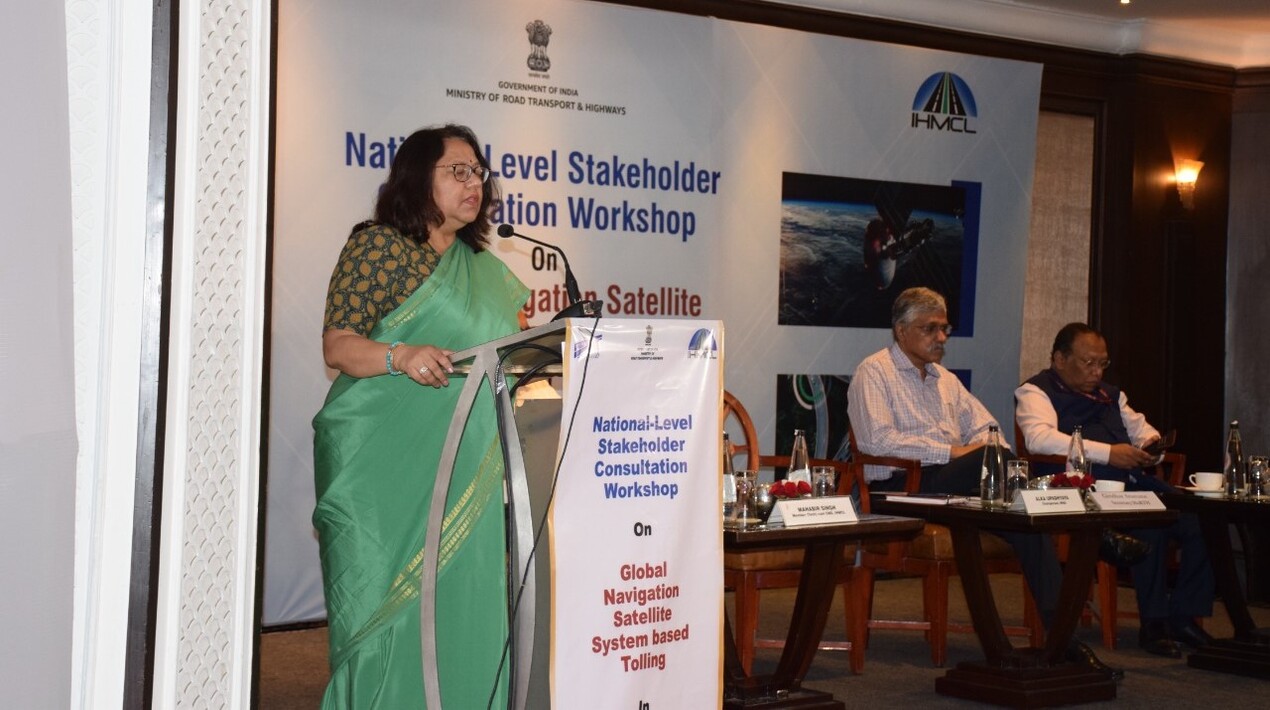
National Highways Authority of India (NHAI) recently organised a day-long stakeholder consultation workshop on Global Navigation Satellite System (GNSS)-based tolling in India. The objective of the workshop was to seek input and suggestions from various industry experts and stakeholders on different aspects of the GNSS-based tolling mechanism and build a roadmap for a free-flow system.
In the proposed GNSS technology-based tolling system, the NH stretch will be geo-fenced and consist of virtual tolling points. Whenever a vehicle fitted with a GNSS on-board unit (OBU) passes through these virtual tolling points, information on the distance travelled will be calculated based on satellite signals from multi-constellation such as NaVIC, GPS, etc., and the applicable fee shall be computed by the central GNSS software system and deducted from the users’ bank account linked to the OBU.
Various stakeholders including relevant government departments, the Indian Space Research Organisation (ISRO), the National Informatics Centre (NIC), and industry players such as vehicle manufacturers, AIS-140 OBU manufacturers, global GNSS service providers, banks, and payment aggregators and gateway service providers were invited. Sessions and presentations were held with consultants and industry experts on the global best practices for GNSS-based tolling. Discussions revolved around the findings of NHAI’s pilot programme for the Delhi-Mumbai corridor, GNSS architecture, payment settlement processes, proposed enforcement measures, and legal framework requirements.
An official from the Ministry of Road Transport and Highways, Giridhar Aramane, noted that the stakeholder consultation was important to discuss various issues involved in GNSS-based tolling deployment and seek suggestions. “We have to ensure that the process of toll collection is seamless. To achieve this objective, we need to have a technology framework that will enable us to operate in an efficient way, is economical and acceptable to various stakeholders,” he said.
Over the past few years, the government has pushed to deploy technology-enabled solutions to better monitor traffic. In April, the Ministry of Electronics and Information developed and launched indigenous onboard driver assistance and warning system (ODAWS), a bus signal priority system, and a Common Smart IoT Connectiv (CoSMiC) software to improve road safety.
As OpenGov Asia explained, ODAWS uses sensors to monitor driver propensity and vehicle surroundings and send out acoustic and visual alerts. The ODAWS algorithm is used to interpret sensor data and offer real-time notifications to the driver. The bus signal priority system is an operational strategy that modifies normal traffic signal operations to better accommodate in-service public buses at signal-controlled intersections.
CoSMiC is middleware software that provides the standard-based deployment of the Internet of things (IoT), which follows the oneM2M-based global standard. It facilitates users and application service providers in vertical domains to use application-agnostic open standards and interfaces for end-to-end communication with well-defined common service functionalities. The CoSMiC common service layer is used to interface with any vendor-specific standards and to increase interoperability with smart city dashboards.
In May, Tamil Nadu launched an artificial intelligence (AI)-enabled panic button and CCTV surveillance project to make travel safer. Under the first phase of the project, 500 buses in the metro city installed four panic buttons, an AI-enabled mobile network video recorder (MNVR), and three cameras each. The MNVR is connected to a cloud-based control centre via a 4G GSM SIM card. In case of inconvenience, discomfort, or threat, passengers will be able to press the panic button and record the incident. At the same time, an alarm will go off at the control centre along with a video recording of the incident on the bus. The operator at the control centre will be able to monitor the situation and facilitate, in real-time, the next course of action.
















